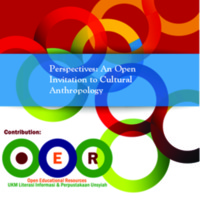Perspectives: An Open Invitation to Cultural Anthropology
Dublin Core
Description
We are delighted to bring to you this novel textbook, a collection of chapters on the essential topics in cultural anthropology. Different from other introductory textbooks, this book is an edited volume with each chapter written by a different author. Each author has written from their experiences
working as an anthropologist and that personal touch makes for an accessible introduction to cultural anthropology.
Our approach to cultural anthropology is holistic. We see the interconnectedness of cultural practices and, in all of the chapters, we emphasize the comparison of cultures and the ways of life of different peoples. We start with Laura Nader’s observation that cultural differences need not be seen
as a problem. In our complicated world of increasing migration, nationalism, and climate challenges, cultural diversity might actually be the source of conflict resolution and new approaches to ensuring a healthier world. Indeed, as Katie Nelson reminds us, anthropology exposes the familiarity in the
ideas and practices of others that seem bizarre. Robert Borofsky advocates for anthropology’s ability to empower people and facilitate good. Borofsky calls on anthropologists to engage with a wider public to bring our incredible stories and important insights to helping resolve the most critical issues
we face in the world today. This book brings Nader, Nelson, Borofsky, and many others together to demonstrate that our anthropological understandings can help all of us to improve the lives of people the world over. We need you, as students, to see the possibilities. As instructors, we want to help you
share anthropological knowledge and understanding easily. We want all readers to be inspired by the intensely personal writings of the anthropologists who contribute to this volume.
working as an anthropologist and that personal touch makes for an accessible introduction to cultural anthropology.
Our approach to cultural anthropology is holistic. We see the interconnectedness of cultural practices and, in all of the chapters, we emphasize the comparison of cultures and the ways of life of different peoples. We start with Laura Nader’s observation that cultural differences need not be seen
as a problem. In our complicated world of increasing migration, nationalism, and climate challenges, cultural diversity might actually be the source of conflict resolution and new approaches to ensuring a healthier world. Indeed, as Katie Nelson reminds us, anthropology exposes the familiarity in the
ideas and practices of others that seem bizarre. Robert Borofsky advocates for anthropology’s ability to empower people and facilitate good. Borofsky calls on anthropologists to engage with a wider public to bring our incredible stories and important insights to helping resolve the most critical issues
we face in the world today. This book brings Nader, Nelson, Borofsky, and many others together to demonstrate that our anthropological understandings can help all of us to improve the lives of people the world over. We need you, as students, to see the possibilities. As instructors, we want to help you
share anthropological knowledge and understanding easily. We want all readers to be inspired by the intensely personal writings of the anthropologists who contribute to this volume.
Publisher
Contributor
Cut Rita Zahara
Rights
Creative Commons
Type
Files
Collection
Citation
“Perspectives: An Open Invitation to Cultural Anthropology,” Open Educational Resources (OER) , accessed March 1, 2026, https://oer.uinsyahada.ac.id/items/show/883.


